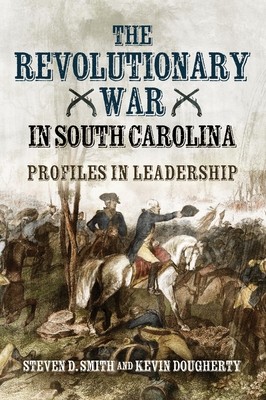
- We will send in 10–14 business days.
- Author: Steven D Smith
- Publisher: Casemate
- ISBN-10: 1636244858
- ISBN-13: 9781636244853
- Format: 16.1 x 23.4 x 2.5 cm, kieti viršeliai
- Language: English
- SAVE -10% with code: EXTRA
Reviews
Description
An examination of the panorama of individuals whose leadership helped make the Patriot cause successful in South Carolina. Historians Kevin Dougherty and Steven D. Smith look beyond the towering figure of Francis Marion to profile significant personalities and actions both on and off the battlefield in this innovative approach to the Revolutionary War in South Carolina.
The book profiles a range of individuals: Henry Laurens was the President of the Council of Safety. Richard Furman was the pastor of a church; John Rutledge was the Governor of South Carolina; and Rebecca Motte was a plantation owner. William Moultrie and Andrew Pickens--perhaps most familiar as soldiers--are discussed in their non-combatant roles: Moultrie as a prisoner of war and Pickens as a post-war civic leader. Military leaders William Jasper, Thomas Sumter, Francis Marion, Isaac Shelby, Nathanael Greene, Daniel Morgan, Tadeusz Kosciuszko, Hezekiah Maham, and Henry Lee round out the selection of profiles.
The profiles are preceded by a historical overview of the Southern Campaign and the Revolutionary War in South Carolina, in order to provide the reader the background necessary to understand the leadership profiles in context. The book's conclusion highlights that the Revolutionary War was a landmark in the "democratization" of war and that the choices made by these leaders and their followers reflect the same element of choice inherent in the democratic process.
EXTRA 10 % discount with code: EXTRA
The promotion ends in 23d.09:59:12
The discount code is valid when purchasing from 10 €. Discounts do not stack.
- Author: Steven D Smith
- Publisher: Casemate
- ISBN-10: 1636244858
- ISBN-13: 9781636244853
- Format: 16.1 x 23.4 x 2.5 cm, kieti viršeliai
- Language: English English
An examination of the panorama of individuals whose leadership helped make the Patriot cause successful in South Carolina. Historians Kevin Dougherty and Steven D. Smith look beyond the towering figure of Francis Marion to profile significant personalities and actions both on and off the battlefield in this innovative approach to the Revolutionary War in South Carolina.
The book profiles a range of individuals: Henry Laurens was the President of the Council of Safety. Richard Furman was the pastor of a church; John Rutledge was the Governor of South Carolina; and Rebecca Motte was a plantation owner. William Moultrie and Andrew Pickens--perhaps most familiar as soldiers--are discussed in their non-combatant roles: Moultrie as a prisoner of war and Pickens as a post-war civic leader. Military leaders William Jasper, Thomas Sumter, Francis Marion, Isaac Shelby, Nathanael Greene, Daniel Morgan, Tadeusz Kosciuszko, Hezekiah Maham, and Henry Lee round out the selection of profiles.
The profiles are preceded by a historical overview of the Southern Campaign and the Revolutionary War in South Carolina, in order to provide the reader the background necessary to understand the leadership profiles in context. The book's conclusion highlights that the Revolutionary War was a landmark in the "democratization" of war and that the choices made by these leaders and their followers reflect the same element of choice inherent in the democratic process.


Reviews